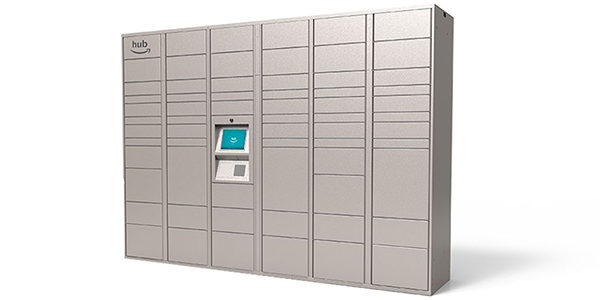Amazon rolls out lockers for parcel delivery to apartment dwellers

E-commerce colossus Amazon.com Inc. said Tuesday it had begun installing parcel delivery lockers in apartment building lobbies across the country in an extension of its network of lockers in storefronts and Whole Foods Markets, saying the system will improve e-commerce access and security in urban environments.
This "Hub by Amazon" service is now available for installation across the U.S., offering apartment residents safe storage of packages, the firm said. To date, more than half a million residents now have access to the lockers, which have been installed in properties managed and owned by real estate firms such as AvalonBay, Fairfield Residential, Pinnacle, J.P. Morgan Asset Management, WinnResidential, and Equity Residential, according to Amazon.
The lockers work in a similar fashion to the banks of lockers that Seattle-based Amazon already offers in many cities through its "Pickup Points" program, where consumers can opt to have their packages delivered to centralized banks of lockers instead of to their homes. Those networks include lockers installed in urban storefronts and in many Whole Foods Markets locations, after Amazon bought the grocery chain in 2017 for $13.7 billion.
One difference from those previous installations is that the Hub lockers cannot yet handle shipments of returns by customers, although Amazon plans to add that feature in coming months, the company said.
In all cases, online shoppers access Amazon's lockers by selecting a nearby locker location as their delivery point—or in the case of the new Hub lockers, using their standard apartment address—and then retrieving their package by entering a security code sent to their computer or smartphone, Amazon said in a video.
Delivering e-commerce orders to lockers instead of individual homes can benefit customers by offering improved security to thwart theft by "porch pirates" and can benefit apartment managers by reducing the clutter of boxes stacked in busy lobbies, according to Amazon. "Building on Amazon's expertise in locker solutions, the Hub addresses frustrations from property owners, carriers, and residents concerning package delivery," Patrick Supanc, director of Amazon Worldwide Lockers and Pickup, said in a statement.
However, the policy could also generate significant business savings to Amazon itself by allowing parcel carriers to reach more customers in each trip, said Jeff Smith, a professor of Supply Chain Management and Analytics at Virginia Commonwealth University. "Amazon and the associated delivery person will save immense amounts of time and energy, as it will enable a single drop point which will allow the delivery person to service each one of those locations in a much more efficient manner," Smith said in an email. "This will cut time in delivery so an individual delivery person could, in theory, make more stops in the same amount of time."
Installing lockers in apartment lobbies is an extension of similar strategies for improving the efficiency of mail delivery, such as the banks of common mailboxes often used by the U.S. Postal Service installed in neighborhoods with dead-end streets, Smith said.
In other examples, UPS Inc. has installed hundreds of self-service parcel lockers around the U.S., following a successful pilot program in Chicago, and vendors like the parcel-fulfillment firm Bell and Howell LLC are marketing "intelligent" lockers for consumer parcel deliveries.
Related Articles

Copyright ©2024. All Rights ReservedDesign, CMS, Hosting & Web Development :: ePublishing